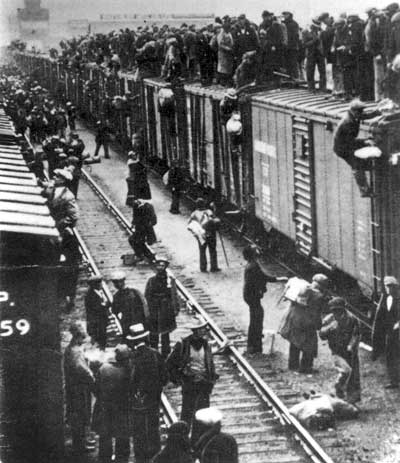Early Friday morning, the Western Canadian “On to Ottawa Caravan” kicked off its journey as a B.C. delegation left Vancouver on route to the Peoples’ Social Forum. The beginnings of the caravan are modest: a single vanload of activists leaving the west coast and three thousand kilometers of Trans-Canada Highway ahead. However, as vehicles join the caravan in each province we pass, leaving their towns and neighbourhoods to gather in Ottawa, it won’t stay modest. At the end of the caravan, we will join together with other activists, thousands strong, united by our desire to build a better country and a better world. But why do we call our caravan “On to Ottawa?”
The “On to Ottawa Trek,” our namesake, occurred in 1935, at a time when Canadian unemployment peaked at around 30%. There was no social assistance and no medical care. The services that we now take for granted as a safety net were left to church groups and charities. So, when 30% of the country found itself in great need, there was no church group large enough to help. The result was a economic vicious cycle. As people became increasingly impoverished, businesses were starved for customers and failed, leaving still more people out of work.
“Relief” camps were Conservative Prime Minister R.B. Bennett’s answer to this crisis. In the camps, men laboured six and a half days per week for 20 cents a day. The tents they slept in were far too hot in the summer and far too cold in the winter. Conditions have been described as similar to a concentration camp. But, for many, it was the only alternative to starvation. In all, more than 170,000 Canadian men worked in the camps. The hard labour of those men built much of our highway system in B.C.

In response to unbarable conditions, a large number of workers organised themselves into the Relief Camp Workers’ Union. In early 1935, the decision was made to risk what little they had and declare a strike. The strikers rode the rails into Vancouver and protested for two months until, out of food and out of options, they decided to bring their strike all the way to Ottawa to confront R.B. Bennett in person. You can read all about the trek at the website of the On to Ottawa Historical Society.
There are many differences between our world today and the world of the relief camp workers, but there are remarkable similarities as well. Both are times of economic crisis and declining living standards. In both times, a hardline Conservative Prime Minister dominates the political landscape from the Calgary West riding, while desperately trying to keep big business profits on the rise despite a failing economy. In both times, those profits are found only by attacking the living standards of working people. And in both times, the vicious economic cycle continues.
Yes, it’s a kinder Canada that we live in today. But our country is far less kind than it was a generation ago. Young people growing up today have no memory of any improvement in living standards, and can anyone seriously suggest that the next generation will be any different? Environmental destruction and the threat of global warming hang over our heads, while our government tries its best to steal every hard-earned victory away from us. During the Great Depression, the struggle was for basic protections and social services. Today, we struggle to hang onto the protections and services that were won in the past. Our battle is defensive. Our children must inherit a world where the coming crises are survivable.

The original On to Ottawa trek was stopped short in Regina when Bennett ordered the RCMP to attack the trekkers with tear gas and brutally beat them with billy clubs. Two strikers died and hundreds more were injured in the police riot that followed. But not everything was bleak. News of the trek’s savage end spread across the country, and with it, awareness of conditions in the relief camps. Some historians would go on to write that R.B. Bennett’s fate was sealed on the day the order was given to stop the Trek. Three months later, the Conservatives lost the election in a landslide, winning only 40 seats to the Liberals’ 173.
Today, the Peoples’ Social Forum offers a similar hope. The unity we can build through this Forum is a huge threat to Harper. As long as he separates our communities and our movements, he can conquer us individually, but together, no force can oppose us. No matter where in the country we live, which culture we belong to, and which issue we are most passionate about, our struggles are the same because our enemies are the same.
Those enemies are the Harper government, the big business interests that stand behind him while polluting our environment and destroying our jobs, and the capitalist system which seeks to make profit the ultimate goal and money the ultimate source of power. Once we join our movements together, money will be no match for the united people of Canada. Harper’s in for a hard fall just as Bennett before him.



